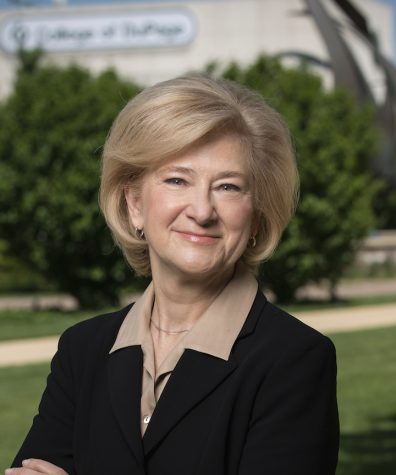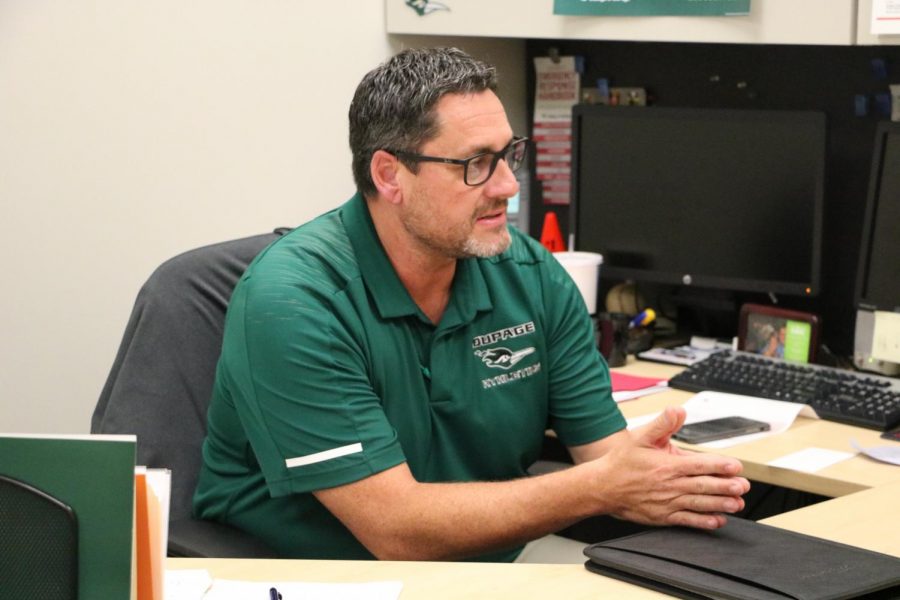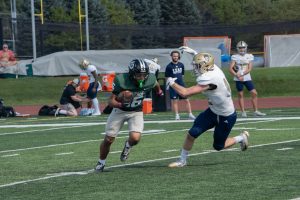Athletic Director Greg McVey addresses the 2017-18 athletic probation and the importance of transparency
All questions about the probation have been strategically directed to McVey, the one person at the school who seems incapable of providing answers
September 12, 2018
When you walk into an interview with the athletic director, and a public relations coordinator is coaching answers from the corner, you come to a sudden realization: President Rondeau’s official policy of transparency comes with certain limitations.
A lack of clarification has fostered mass confusion amongst the students regarding College of DuPage’s 2018-19 NJCAA postseason athletic probation.
We turned to student-athletes, who have been directed by their coaches to keep their opinions to themselves.
We turned to coaches, who said they could not speak of the matter without the athletic director signing off on it first.
And we turned to the athletic director, Greg McVey (hired on June 21), who is there to assure us there isn’t, “any conspiracy.”
“There’s not really a gag-order in place. Everybody has the right to express their own opinions and feelings about the situation. If there is anyone who feels they cannot share their opinion, they are misinformed.
“If you want to talk specifics about the audit or probation, I would prefer it comes directly through me,” said McVey.
McVey also stated, “It’s really interesting from my perspective, people would be commenting on things they don’t know about.”
However, McVey denied having read the internal audit inspiring the probation, and denied having any knowledge of specifics on the violations. He also denied knowing the mistakes of the previous athletic director or if the violations were the reason behind his departure.
McVey also denied knowing anyone who has read the internal audit.

At COD, transparency means all questions must be directed to the one who can’t provide the answers.
Following an internal audit finding violations dating back to 2013 of ineligible athletes participating, the NJCAA issued the year-long post-season ban. The school can apply for reinstatement to be taken off probation in May.
The college also has to forfeit all postseason wins for the 2016-17 school year. Any awards won, will have to be packaged in boxes and shipped back to the NJCAA.
According to McVey, the coaches were first made aware of the sanctions on August 30, the day the college received the NJCAA report.
He said he did not know if coaches knew of the violations or the possibility of sanctions before that date.
Student-athletes were informed of their post-season ban the following day. Most recruiters offering scholarships make their decisions in accordance with postseason performance and success. Players were given the option of transferring to another school unabated by sanctions; however, the timing eliminated any practical chance at transferring before school admission deadlines.
When asked why students weren’t notified earlier by the school given the likelihood of sanctions, McVey responded, “Yes, the timing was unfortunate, but we can’t determine when the NJCAA sends us their findings.”
He declined to comment if students were intentionally kept in the dark to prevent a mass exodus and maintain enrollment figures.
McVey stated players should, “Treat every game like it’s playoffs. We can’t forget we are still giving them the opportunity to continue their sport. We are still giving them the opportunity to be seen by four-year institutions. We are not taking any of that away.”
When addressing the difficulties of being seen by recruiters now, McVey claimed, “If a student-athlete has a specific skill set that matches another institution’s needs, they will be found.”
McVey wasn’t aware of when the NJCAA was notified of COD’s internal audit.
He said the NJCAA did not conduct their own review. They accepted COD’s findings in the internal audit and the independent review by an outside law firm.
NJCAA saw fit to hand down a one-year punishment off of a school’s self-reporting without the reassurance of their own findings.
McVey said the NJCAA trusted our self-reporting because the school “showed the integrity to (self-report.)” He stated, “During the probation, (the NJCAA has) the right to audit any of our sports if they wish. They randomly audit every three years anyways.”
When asked why the last random audit didn’t catch the violations dating back to 2013, McVey said he did not have an answer.
The violations for ineligible athletes participating resulted from paperwork for NJCAA eligibility not being completed. This included amongst others, required physicals, credit hours, transcripts for transfer students, NJCAA affidavits and proper high school transcripts.
McVey claimed to not know specifics about the “processing issues” involved in the paperwork. They are detailed in the audit, something he claims to not have seen.
To get specifics of the audit findings, Jennifer Duda, the public relations coordinator guiding McVey suggested we file a Freedom of Information Act.
A Freedom of Information Act (FOIA) requires filing a legal request, sometimes involving lawyers. The audit is a public document; however, making the public request a FOIA, instead of willingly providing the audit, is deemed a deterrent strategy to public insight.
When asked if the violations were endemic to certain sports or spread throughout the department, McVey replied, “When you look through it, you will see it was prevalent through every sport. There were problems in the processing for all our sports. It has nothing to do with the coach or the student-athlete, it was a processing issue.”
McVey said he did not know why the paperwork was not properly done.
When asked if there were any internal or external pressures to intentionally not file the paperwork, given the ineligible athletes helped bring success to the school, McVey responded, “It was all started before I was hired, so I cannot answer that question.”
McVey believes around 98% of schools run the paperwork out of the athletic department rather than the academic department.
When questioned if the practice seems unethical given athletic departments’ self-interests, McVey responded, “It’s run through the athletic director because the athletic director is the one who actually submits the forms.”
McVey addressed whether he was aware or informed of the implications leading to the probation prior to his hire.
“When you come into a new situation, you realize there are things you are going to have to handle as an administrator. You may not know specific details about everything that’s going on, but you know there are going to be challenges. I’m aware that there are challenges, and I’m aware that this might have been one of the challenges.”
McVey said he wasn’t sure the committee who hired him “knew these challenges were going on.”
McVey believes he has the professional ability to address the “challenges.”
“We made the right changes and have the right people as a team doing all of the eligibility now. I’m responsible for it, but in the end of the day, we have a team putting everything together to make sure (eligibility paperwork is) done properly from this point forward.”
Detailed in Rondeau’s letter announcing the probation, part of the new changes implemented include the Student Information System now being used to confirm eligibility for all athletes.
McVey also explained, he and his team completed a NJCAA compliance professional development training seminar in Charlotte, N.C.
How can the athletic department staff learn to correct the errors that led to violations when they aren’t aware of the specific violations and have no intimate knowledge of the internal audit?
McVey left the question unanswered.
All questions regarding the probation must be directed to McVey, but answered only if they involve the “process of the audit.”
Perplexingly, McVey stated, “There is not anybody involved in this even here anymore.”
He continued, “All these things went on before I got here. I don’t know if anyone was held accountable.”
Given the seriousness of the post-season probation for students, and the amount of information McVey claims he is not aware of, he was asked if any questions about the matter or additional information interests him and his staff.
Calculating his response, McVey responded, “No.”
With the confusion amongst offended students not being given answers, his response seems surprising.
The last question fittingly addressed Rondeau’s official school policy of transparency.
McVey waxed poetic, “I think the fact we self-reported to the NJCAA is very transparent. I commend COD for doing it.”




















